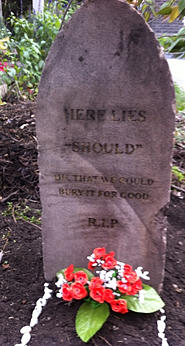Should you... really?
 |
| Art Installation 'Here Lies Should' by Robyn deVries |
Sometime ago I was observing, in a conversation with a friend, the things that I thought I should be doing, what I should be content with right now. My friend shook her head.
"Oo all those 'shoulds'..." she said.
Unfortunately she never elaborated. We moved on. But the question of those 'shoulds' remained with me. What did they mean?
Then recently, I happened to be at Abbotsford Convent in Melbourne, where there is an art installation by Robyn deVries from the Melbourne Art Therapy Studio, entitled 'Here Lies Should'. It is a quiet place for people to come and bury their shoulds.
So the universe has clearly been trying to send me a message. 'Should' must go. But why?
Should signals a disconnection from our own values. Should is an indicator that you are framing things in terms of other people's expectations. The 'norm', perhaps even the 'right thing'. It is as though you remember that there is an expectation for a certain behaviour, but you can't quite remember why.
If you really think that you 'should' be doing something, you would probably have done it already. If you were genuinely excited about doing this thing you most likely would have said I am going to do that, or I will do that, rather than I should do that.
I should eat more vegetables. This sounds like something you were told as a child. It was neither fun nor motivating back then, and it isn't either of those things now. Instead of telling ourselves what we should do, it is better to affirm our own values. I want to be healthy would be a much better substitute. Our minds are smart enough to join the dots from this desire to the vegetables. There is no need for the dictates of authority voices inside our own heads. In fact, don't they even awaken our rebellious streaks?
If you use should in connection with something in the past, the chances are there is some guilt involved. 'Should have' is the wagging finger of your inner critic. Unhelpful. Perhaps it would have been better if you had done that thing. Either way, it's too late. Should doesn't help. Its constructive purpose is to identify a way to improve, a way to do something better. Unless you can view it in this more positive context, as something to aim for next time, it is most likely just counter productive.
So next time you hear yourself say 'I should...' it is probably time to pause.
Should you, really?
The better question is ...what do you really want?
